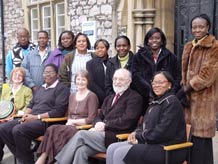
Nigerian teachers from the Corona Group of Schools in Lagos with scholars from the University’s School of Education and Lifelong Learning, Professor Debra Myhill, Olwen Goodall and Dr Jack Priestley at the St Luke’s Campus.
Nigerian teachers investigate rural schools
A select group of African teachers from Nigeria are visiting the South West, to find out more about the way school children are encouraged to interact in the classroom and in after school clubs.
The visit is part of a wider programme of events organised by the University’s School of Education and Lifelong Learning who have been developing links with educational organisations in Nigeria since 1976.
The teachers are here to gain further insight into the current developments in teaching and learning in the UK and to share African approaches to Education. Academics from Exeter have recently spent time in the commercial city of Lagos providing courses for Nigerian teachers on ways to encourage student participation and different ways of teaching.
The Head of the School of Education and Lifelong Learning, Professor Debra Myhill said of the work with the educational authorities in Lagos, ‘With an ethos of educational excellence, we are thrilled that the Corona group of primary and secondary schools in Nigeria sought the expertise of the University of Exeter as a result of our highly-ranked specialisms in Education.’
She added, ‘A better global understanding of different teaching practices enables both academics at Exeter and teachers in local schools to bring international exchange back into the classroom to better inform pupils and students.’
Ladysmith Infants and Junior School and St Peter’s High School in Exeter are two of the numerous University of Exeter Partnership schools in Devon and Somerset who are involved in hosting the Nigerian teachers. School management and organisation are the main areas of interest in the secondary schools. Classroom observations at the primary schools will focus on science, maths, computer literacy and classroom displays. This may prove to be quite an experience not only for the visiting teachers but for the school pupils who may never have met anyone from Africa. Olwen Goodall, Head of External Affairs and International Coordinator, who spent her early childhood in Nigeria before returning to the UK said, ‘This interaction is a positive and will open the eyes of children to the world they live in and the variety of people in it. The experience may also help some of the pupils to overcome the obstacle of what is seen of Africa in the media which tends to focus on charity, poverty and disease and thereby not giving a fuller picture of life in that country.’
International links have always been an important part of the School of Education. In 1976 a group of 12 mature students from Sokoto, the northern region of Nigeria which borders the Sahara desert and predominantly Islamic came to Exeter to study teacher training. It was the first international visit outside of Europe, the first group from Africa and the first time Muslim students had visited St Luke’s, which was a Church of England Teacher Training College prior to the merger with the University of Exeter in 1978.
An experience which Dr Jack Priestley recalls, he said ‘The students were dignified and well-mannered at all times and like many Nigerians held Education in high esteem. As a Christian college we respected their religious ceremonies like Ramadan and they were respectful of our religious practices.’
The current group of teachers visiting schools in Devon and Somerset are unlike the 1976 students, as they are from Lagos in the south of Nigeria a more religiously mixed area with both Muslims and Christians.
Date: 2 March 2009
